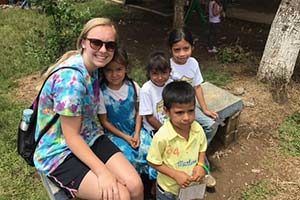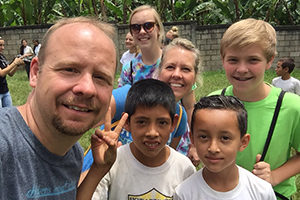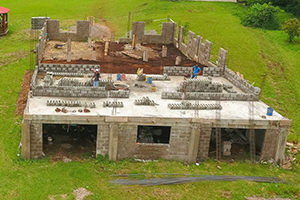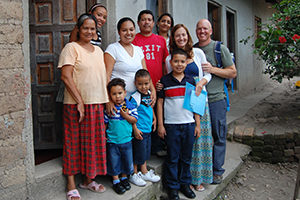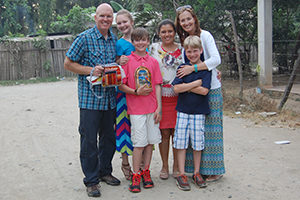by Linda L. Esterson
Kim Hott tears up when she describes the poverty she has seen in Honduras. Homes that make storage sheds in the United States look glorious. Dirt floors, small cement ovens set on tables in the center of a room. Buckets of dirty water from outside holding mud and fish and who knows what else.
“You won’t believe it until you see it,” she says, her voice breaking.
Hott also describes a lack of emergency medical services, minimal medical care, and no police presence, especially in remote areas.
Hott felt a calling from God to help. So, in 2014, she and her husband, Mike, joined about 20 fellow members of New Hope Fellowship Church in Westminster on a mission trip organized by the Children’s Impact Network, one of about seven missionary groups the church supports. They had considered making the trip for some time, after helping local ministries at soup kitchens and sponsoring African children similar to their own children’s ages through Food for the Hungry, and seeing presentations from other missionaries.
The No. 1 reason they went, Kim says, was spiritual: “to share God’s love with these children. They may not have a mom or a dad, but God loves them.”
Upon arriving in Honduras, the group visited some of the area’s neediest families and delivered clothing and 10 bags of food — enough to last 30 days. They also prayed for the families’ well-being. During their weeklong stay, they spent mornings helping to construct a home for orphans and in the afternoon directed what they called a “Sidewalk Sunday School,” with skits, crafts and play to share the Gospel with the 500 children who participated. They brought soccer balls, Frisbees and jump ropes, and painted the girls’ nails. They say their reward was seeing the smiling children happy to greet them, spending time with them and being able to share Jesus with the children at the different villages they visited.
Their goal is to help these children escape the bonds of poverty. Building the orphanage gave them a home, and hope for a future.
“They are learning how to come out of the situation they were put in without putting their families in the same situation, and how to be productive citizens in the villages and cities they live in,” Mike says.
The Hotts returned to Honduras the following year and helped construct a second orphanage. They also brought their children, Madison, now 17, and Maxwell, now 14, along. The family went again this year and plans to return in 2018.
“We want to make them aware of how blessed we are, to show them and teach them to be willing to give,” Kim says of her children.
Mike recounts a visit during which a child was struggling in shoes that were too tight. A child on the mission trip gave up her own shoes and went barefoot.
“It just feels good to bless other people,” adds Kim. “We go there to help and come back feeling blessed.”
Madison admits being nervous the first time, having never been out of the country. Looking back, she’s thankful for the chance to give to the children, play with them, and talk with them, even with a language barrier.
“You just appreciate things more, and small things do not bother me as much anymore,” says Madison, who now contemplates learning Spanish so she can serve as an interpreter on future mission trips. “If you can’t buy something, you know some people didn’t have the opportunity at all. … I can drive to the store, and they walk miles just to get a little snack or drink.”
Mission trips give parishioners an opportunity to serve using their gifts for specialized ministries projects, says Ralf Nies, pastor of Grace Fellowship Chapel in Westminster.
“They allow folks an opportunity to experience another culture and speak the message of Christ — love in action. They allow Christians to fulfill the Great Commission of ‘going into all the world,’” he said.
Nies has participated in six mission trips, all to the Dominican Republic, between 2007 and 2012.
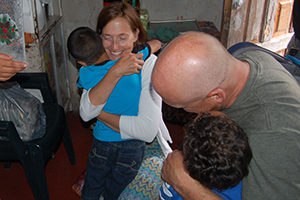
The sponsorship provides necessities, medical care, dietary supplements for the child and enables them to enroll in a special school funded through the organization.
Five of Nies’ trips were coordinated by The Least of These, a ministry program that has led weeklong service trips to the Dominican Republic for the past 20 years. Participants have built churches and building additions, latrines and water treatment facilities, says Marty Hogan, executive director of The Least of These. On recent trips, missionaries have replaced dirt floors with concrete, and provided Bible school for children, food for families and playtime with area children.
Participants are referred to The Least of These through churches and former travelers. They include married couples, families with children and individuals. Over the past 20 years, The Least of These has sent over 250 people to 13 impoverished villages in the Dominican Republic, providing food and service — and hope for self-sustainability. Sometimes participants commit to becoming missionaries and spend two years helping village leaders.
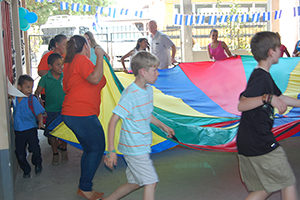
The sponsorship also includes letter writing, and the Puckett children became pen pals with their Honduran counterparts.
Hogan served as a missionary for nearly two years. “I was looking at my life several years prior, and I could see that God was preparing me and my family for that,” he says. “I didn’t ever plan to do that. When the question came up, I knew it was the right thing to do.”
Westminster resident Aaron Puckett also felt a pull to help the impoverished in other countries. When his daughter Annabelle was 3 years old, he and his wife, Judie, discussed what Annabelle’s life would be like if she had been born in an impoverished country. That’s when they decided to sponsor a girl the same age in Honduras through Compassion International. A previous mission trip had taken Judie there, and she had seen areas that were in dire need of help.
When their sons Micah and Abe joined the family, the Pucketts sponsored boys their age as well. Sponsorship through Compassion International consists of a monthly contribution (now $38) that provides necessities, medical care, dietary supplements for the child and enables them to enroll in a special school funded through the organization.
The sponsorship also includes letter writing, and the Puckett children became pen pals with their Honduran counterparts. They also pray for them every night. With the children now 15, 13, and 11, they think of the Hondurans as their brothers and sister.
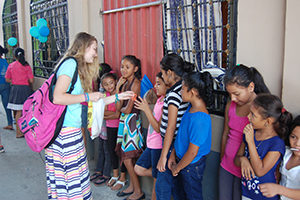
Aaron and Judie’s children Annabelle, Micah, and Abe have embraced the dedication to help others, as well.
“It’s a heart connection for these kids,” Aaron says.
Five years ago, Aaron and Judie traveled to Honduras to meet their Honduran “family.” They visited three areas of the country, spending one day with each sponsored child. Two years ago, their children accompanied them, and each brought a personal gift for their “sibling.” Annabelle brought Vicky a matching outfit, Abe gave Ricardo a Wiffle ball set, and Micah presented Daniel with a spinning top. And all witnessed the bonds that developed through their letters.
“Both girls were sobbing,” Aaron says of Annabelle’s first meeting with Vicky. “It was so beautiful to see they are connected at the heart.
When they first met Daniel, at age 11, he pulled out a shoebox that held every letter, picture and sticker their children had ever sent to him.
“This is shaping our kids,” he adds. “It was not the plan when we set out, [but] our kids now have a context for life.”
During each visit, they took each child and their families to the market to buy them food. One mother bought a bag of rice and another of beans, and attempted to complete the purchase. The Pucketts instead grabbed a shopping cart, which they loaded up with groceries.
“They went from being in shock to being in tears,” Aaron says.
The trip proved just as meaningful for the Pucketts.
“This was more fun for us than when we took the kids to Disney World,” Aaron says. “Nothing compares to the feeling of being able to do something like that.”
Unlike the church-sponsored groups that partially subsidize trips through fundraising, the Pucketts self-funded their trips. Aaron estimates it cost a total of $5,000, which he would have spent on a vacation for the family of five. But now they have much more to show for the expense.
Since their last trip, the Pucketts have sponsored a fourth child. They plan to visit all four in April.
Kim Hott hopes spreading the word about their travels will inspire others to “step out of their comfort zone.”
“It’s a lot easier to go to a local soup kitchen,” she says. “When you travel to a place like this, you truly do affect them by sharing the word of God and helping with their needs.”


